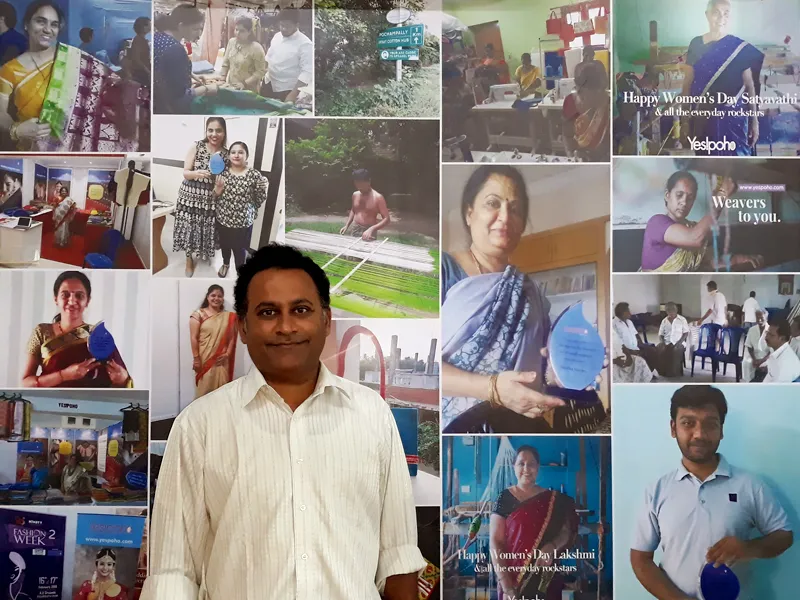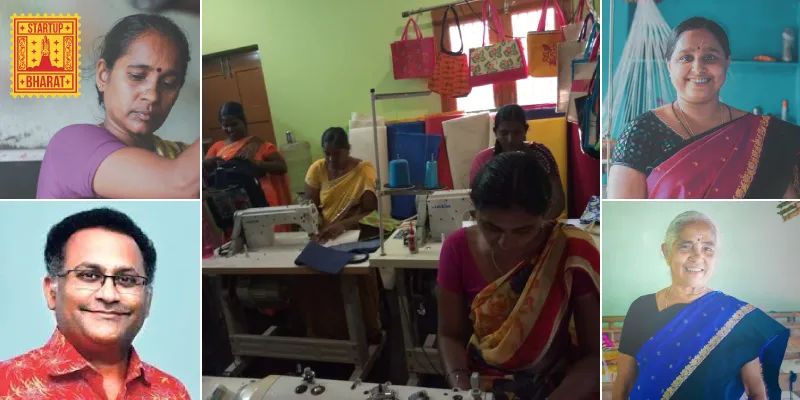[Startup Bharat] Visakhapatnam-based Yes!poho is bringing weavers and shoppers together, one saree at a time
From Pochampally and Ikkat to Banarasi silk, Yes!poho offers a wide selection of sarees - all sourced directly from the weaving villages of India.
There is a romance and elegance to the saree that no other piece of clothing can match – yes, we’ve all heard this before, and while sarees made up a majority of our moms and grannys’ wardrobe, fast fashion found the saree losing favour.
But that’s changing. Increasingly, women are taking to the saree as corporate and casual wear, and even making wearing it trendy (remember the 100saree challenge?) There, however, remains one big problem – the originality and quality of the sarees.
And to solve that, there’s Yes!poho. The online platform allows weavers and artisans to directly connect with customers, allowing them to sell handloom sarees without any middlemen. As soon as an order is received, the weavers are notified through operational hubs located close to their village. They get to work, and once the saree is ready, an agent is sent to inspect the product before it is shipped.

Raghuram Kuchibhatla, Founder Yes!poho
Also read: [Startup Bharat] How Brand Balance is bringing digital marketing options to smaller cities and towns
Founded in 2017 by Raghuram Kuchibhatla, the Visakhapatnam-headquartered startup not only works towards improving the socio-economic status of the weavers, but allows buyers easy access to a wide range of traditional sarees. Yes!poho’s ‘techno-experience’ also helps a buyer take a virtual trial of a saree.
The startup has so far on-boarded close to 40 weavers from the villages of Veeravaram and Ramachandrapuram in Andhra Pradesh, Kullakkapalayam in Tamil Nadu, Badkulla in West Bengal, Champa Nagar in Bihar, and Pochampally in Telangana.

The lightbulb moment
Raghuram, who has a Master’s degree in Electrical Engineering and Computer Science from Texas, and an MBA from Lubin School of Business, New York, hit upon the idea of starting Yes!poho when he travelled to India in 2015 and was buying sarees for his wife.
“The entire shopping experience was not pleasant,” he says. Not only did he find it cumbersome to brave the traffic to visit multiple stores, but was also dissuaded by inconsistent prices and no-return policies.
“Consumers do not have a say in the manufacturing process,” he adds. “This means that while tastes and preferences have changed, design and manufacturing have not changed to suit the consumer’s preferences.”
Raghuram drew upon this experience to create a checklist of solutions that would benefit both, the shopper as well as the artisan.
Ticking all the boxes
On the Yes!poho platform, “Not only do the buyers get to access a wide range of products, they also have the option of virtually trying on the saree and sharing the experience with their friends and family through our social network,” says Raghuram.
The startup takes feedback on the product range and catalogue from customers and passes this on to the weavers who can make sarees according to latest trends and to cater to different tastes. The company has also initiated the ‘Yes!poho Institute’ - an online training programme open to all those associated with the company and interested in enhancing their skills in areas such as accounting, technology, and automation.
Challenges and Growth
It hasn’t been all smooth sailing for the company. Raghuram says the saree market is highly fragmented and unorganised. “The saree is not a standardised product, which means there is no fixed benchmark for price or design. Also, the virtual trial experience that Yes!poho offers is a fairly recent trend within the online shopping industry.”
In spite of this, the startup has recorded a growth rate of 20-35 percent month-on-month. Yes!poho’s parent company, Yespoho Inc, is registered in the US, but all its operations are in India. The startup is funded by US-based Vatsacapital - which holds about 55 percent equity in the company. Raghuram says Yes!poho aims to meet a target of $1 million in revenue by the end of April 2020.
Charting out the roadmap
The handicrafts sector in India is one of the leading sources of employment in the country. According to an IBEF report, the period from April to November in 2018 witnessed exports of Indian handicrafts worth $2.42 billion. Several online marketplaces such as Festivya, CraftsBazaar, and Tijori have been vying for dominance in this sector.
On the company’s future plans, Raghuram said he plans to expand the business to include other villages in each of the states they currently operate in. The team also sponsors a group of economically disadvantaged homemakers in Vijayawada to become independent entrepreneurs and plans to expand this programme as well. Raghuram says the homemakers in Vijayawada manufacture jute bags under the guidance of Yes!poho, which are used not only by the startup, but by other clients too.
The startup also plans to foray into the Northeast. “It is not humanly possible for us to reach all villages by ourselves,” explains Raghuram. “So, we’re planning to rope in NGOs and government departments for their assistance.” With time, the company intends to include other verticals from the handicraft sector such as jewellery. Yes!poho will soon be open to receiving external capital in order to better invest in customer experience, as well as the socio-economic wellbeing of the weavers, he added.


![[Startup Bharat] Visakhapatnam-based Yes!poho is bringing weavers and shoppers together, one saree at a time](https://images.yourstory.com/cs/2/a9efa9c0-2dd9-11e9-adc5-2d913c55075e/Raghu-sir1558432021841.jpg?mode=crop&crop=faces&ar=16%3A9&format=auto&w=1920&q=75)




